
Dimeresia is a monotypic genus in the sunflower family containing the single species Dimeresia howellii, known by the common name doublet.
Mentzelia crocea, the Sierra blazingstar or saffron blazing star, is an annual wildflower endemic to the Sierra Nevada foothills of California.

Ipomopsis congesta is a species of flowering plant in the phlox family, known by the common name ballhead ipomopsis. It is native to much of western North America, where it grows in many habitats from alpine peaks to low-elevation scrub. It is a perennial herb which varies in appearance, especially across subspecies and climates. It may take the form of a squat patch with stems under 10 centimeters in height or a more erect form up to 30 centimeters tall. The stems are often hairy to woolly. The thick leaves are usually fork-shaped with a number of clawlike lobes and 1 to 4 centimeters long. The flowers appear in a rounded, dense cluster atop the stem. Each flower is bell-shaped to funnel-shaped and white with a pale yellow throat and protruding yellow or white stamens. There are several subspecies, many of which were formerly considered species of Gilia.

Antirrhinum filipes is an annual species of North American snapdragon, usually known by the common name yellow twining snapdragon. This herbaceous plant is native to deserts of the southwestern United States and northern Mexico, where it is common.
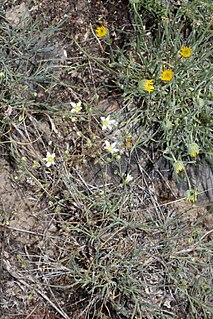
Eremogone congesta is a species of flowering plant in the family Caryophyllaceae known by the common name ballhead sandwort. It is native to western North America from central Canada to the American southwest.
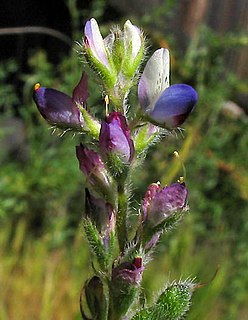
Lupinus concinnus is a species of lupine known by the common name Bajada lupine. It is native to the southwestern United States from California to Texas, and northern Mexico, where it is known from many types of habitat. This is a hairy erect or decumbent annual herb with a stem growing 10 to 30 centimeters long. Each small palmate leaf is made up of 5 to 9 leaflets up to 3 centimeters long and under a centimeter wide, sometimes narrow and linear in shape. The inflorescence is a dense spiral of flowers, with some flowers also appearing in leaf axils lower on the plant. Each flower is 5 to 12 millimeters long and purple, pink, or nearly white in color. The fruit is a hairy legume pod around a centimeter long.
Mentzelia affinis is a species of flowering plants in the family Loasaceae known by the common name yellowcomet. It is native to the southern half of California, Arizona, and adjacent sections of Nevada and Baja California, where it is known from scrub, woodland, desert sands, and other habitat types.
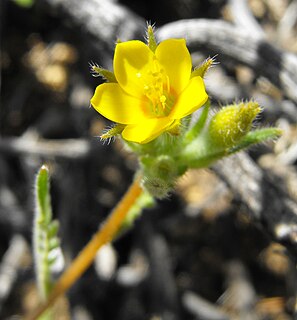
Mentzelia albicaulis is a species of flowering plants in the family Loasaceae known by the common names whitestem blazingstar, white-stemmed stickleaf, and small flowered blazing star. It is native to much of western North America, where it grows in mountain, desert, and plateau habitat.

Mentzelia dispersa is a species of flowering plant in the family Loasaceae known by the common name bushy blazingstar. It is native to western North America from British Columbia to California to the Dakotas, where it grows in many types of habitat.

Mentzelia gracilenta, known by the common names blazing star, grass blazingstar, and slender blazing star, is a species of flowering plant in the family Loasaceae.

Mentzelia micrantha is a species of flowering plant in the family Loasaceae known by the common name San Luis blazingstar.

Mentzelia montana, known by the common name variegated bract blazingstar, is a species of flowering plant in the family Loasaceae.
Mentzelia oreophila is a species of flowering plant in the family Loasaceae known by the common name Argus blazingstar. It is native to the Southwestern United States and the Mojave Desert sky islands in California. It grows in rocky desert and scrub habitat.

Mentzelia pectinata is a species of flowering plant in the family Loasaceae known by the common name San Joaquin blazingstar.
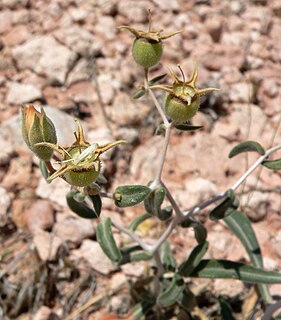
Mentzelia polita is a species of flowering plant in the family Loasaceae known by the common name polished blazingstar. It is native to the southwestern United States, where it grows in desert mountains, washes, and other dry habitat.
Mentzelia reflexa is a species of flowering plant in the family Loasaceae known by the common name reflexed blazingstar.
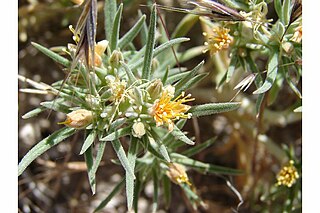
Mentzelia torreyi is a species of flowering plant in the family Loasaceae known by the common name Torrey's blazingstar. It is native to the western United States where it grows in the Great Basin and surrounding areas in desert, scrub, woodland, and other habitat.

Mentzelia tricuspis is a species of flowering plant in the family Loasaceae known by the common name spinyhair blazingstar.

Mentzelia veatchiana is a species of flowering plant in the family Loasaceae known by the common name Veatch's blazingstar.
Smelowskia ovalis is a species of flowering plant in the mustard family known by the common name alpine false candytuft. It is native to western North America from British Columbia to northern California, occurring mostly in the Cascade Range. It is a plant of alpine climates, growing in high mountain habitat such as talus and fellfields. It is clumpy in shape, producing several hairy stems growing erect to a maximum height around 18 centimeters. The densely hairy leaves are divided into several oval leaflets. The longest leaves are arranged around the base of the plant, and a few smaller ones occur farther up the stems. The inflorescence is a dense, spherical raceme of flowers that elongates as the fruits develop. The flowers have white or pink-tinged petals each a few millimeters long. The fruit is a short silique.














